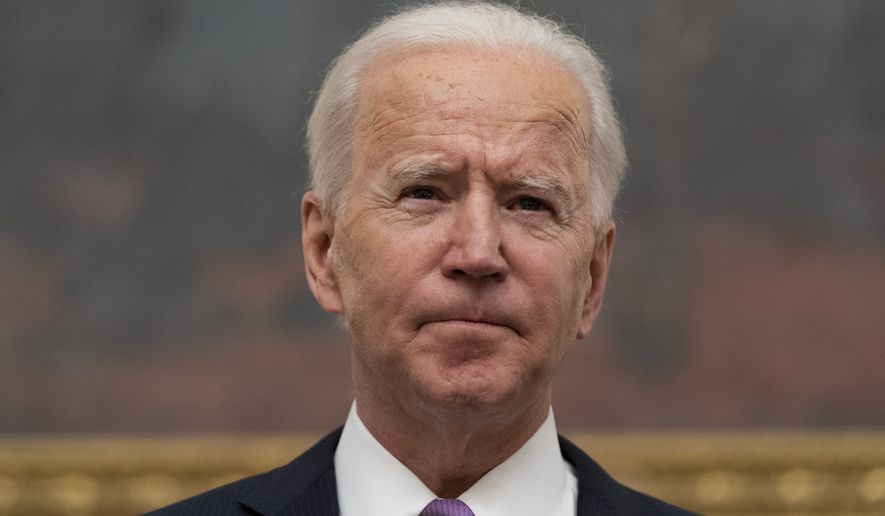President Biden promised during the campaign to create “millions of good-paying jobs” with his green-energy plan, but so far thousands of jobs have been threatened by his orders targeting the oil-and-gas sector.
On the same day that Mr. Biden canceled the Keystone XL pipeline permit, his administration temporarily halted new drilling permits on public lands and waters, raising concerns about more energy-sector job losses as the economy continues to reel from the novel coronavirus pandemic.
“I think many of the orders that he came forward with will lead to unemployment,” said Sen. Rand Paul, Kentucky Republican, on Fox News.
Acting Interior Secretary Scott de la Vega issued a memo dated Wednesday suspending for 60 days any new permits, leases, easements and land management related to mineral production for a “targeted and time-limited” review of “relevant decisions at the Department of the Interior.”
Dan Naatz, Independent Petroleum Association of America senior vice president of government relations and political affairs, called the order “a misguided proposal that will decimate jobs and economic development” in U.S. communities while boosting foreign producers.
“In their never-ending desire to placate the environmental community, the Democrats are not only willing to destroy the economies of many western states and the Gulf Coast, but also impact world markets,” Mr. Naatz said. “All a leasing ban will do is shift production to Saudi Arabia and Russia, which have far less-stringent environmental controls than American producers.”
The decision comes with climate groups cheering Mr. Biden for “putting climate first” with his torrent of first-day environmental orders as producers and unions assess the damage from his KXL decision, which places in jeopardy an estimated 11,000 in jobs and $2 billion in wages.
TC Energy, the pipeline’s owner, said that Mr. Biden’s order canceling the 2017 permit will “directly lead to the layoff of thousands of union workers and negatively impact ground-breaking industry commitments to use new renewable energy as well as historic equity partnerships with Indigenous communities.”
TC Energy has partnered with Natural Law Energy, a Canadian company run by five tribes, on the project, a 1,179-mile pipeline that would run crude oil from Alberta, Canada, to Steele City, Nebraska, linking after that to U.S. oil terminals and refineries.
North America’s Building Trades Unions, which represents 14 U.S. and Canadian construction unions, said it was “deeply disappointed in the decision to cancel the Keystone XL permit on the president’s first day in office,” and that layoffs had already begun.
“Environmental ideologues have now prevailed, and over a thousand union men and women have been terminated from employment on the project,” said NABTU in a statement. “On a historic day that is filled with hope and optimism for so many Americans and people around the world, tens of thousands of workers are left to wonder what the future holds for them.”
NABTU President @SeanMcGarvey_ released the following statement in response to the @KXLPipeline cancellation announced yesterday by the Biden Administration.
— The Building Trades (@NABTU) January 21, 2021
: https://t.co/BZLjG9EDa3 pic.twitter.com/lTiZ4wvgjG
Mr. Biden promised during the 2020 presidential campaign to ban hydraulic fracturing on federal lands, prompting a University of Wyoming study that found fiscal and economic losses from such a moratorium from 2021-2040 would exceed $640 billion.
He said he would create more jobs with his $2 trillion climate and energy plan, which seeks to supplant fossil fuels with solar and wind power in electricity generation by 2035, and achieve net-zero emissions by 2050.
Getting there could be economically painful, however, if the first step is to cripple the U.S. oil-and-gas industry.
A U.S. Chamber of Commerce study found that 24% of U.S. coal, oil and natural gas was mined or extracted from federal lands, which are located predominantly in the West.
“Blocking American companies from accessing our country’s natural resources is bad for American jobs, bad for state budgets, and bad for national security,” said Anne Bradbury, CEO of the American Exploration and Production Council. “Less production domestically means importing more oil and gas from less regulated, unstable nations.”
• Dave Boyer can be reached at dboyer@washingtontimes.com.




Please read our comment policy before commenting.